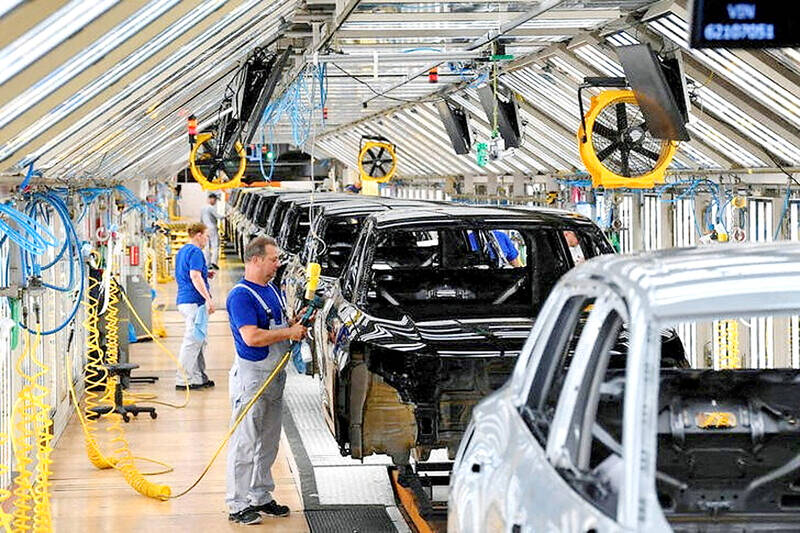Volkswagen AG (VW) and its oldest Chinese partner plan to shutter one plant in China and possibly more in response to slowing demand for combustion-engine cars, in a further pullback after the venture’s first factory ceased output.
The company’s four-decade-old business with SAIC Motor Corp (上海汽車集團) is preparing to close a factory in Nanjing as soon as next year, people familiar with the matter said. The site, which makes VW Passat and Skoda cars, has an annual capacity of as many as 360,000 vehicles.
At its Shanghai base, SAIC VW Automobile Co (上汽大眾汽車) stopped production two years ago at one factory that had been open since the mid-1980s. A second plant has reduced output and could also be shut or overhauled, said the people, who asked not to be named before final decisions are made.

Photo: Reuters
The partners are also conducting a strategy review of VW’s mass-market Skoda brand after a steep drop in sales, the company confirmed, underscoring the magnitude of the difficulties the automaker faces in China. A facility in Ningbo, in Zhejiang Province, that makes several Skoda models is being idled for months at a time and also is being considered for closure, the people said.
“All SAIC VW factories are operating normally according to the market requirements and our forecast,” VW China said in an e-mail.
As the focus shifts toward smart electric vehicles (EVs), “we are also transforming vehicle production and the components plants step by step,” it said.
The unprecedented retreat in VW’s biggest market is being driven by a consumer slump and a rapid shift toward EVs that has left the German manufacturer with too much conventional automaking capacity.
Production at VW’s 39 Chinese plants last year remained more than a quarter below its peak before Covid-19. Its share of operating earnings from its Chinese ventures fell 20 percent last year to 2.62 billion euros (US$2.92 billion), and is down by about half from its highest level in 2015.
SAIC has also suffered from weak sales. Profits from the joint venture with VW have been falling for five years, from a peak of 28 billion yuan (US$3.9 billion) in 2018 to just 3.13 billion yuan in 2023.
VW is reassessing its Chinese footprint as it weighs plant closures at home, highlighting the complex challenges the company must navigate to stay ahead of a perilous and uneven global transition away from fossil fuel vehicles.
While VW and other manufacturers were caught off-guard by stagnating EV demand in Europe this year, electrification is rapidly moving ahead in China. There, local rivals such as BYD Co (比亞迪) have seized the upper hand with innovative and affordable models.
Across China, sales of battery EVs and plug-in hybrids rose 43 percent last month to 1.03 million units from a year earlier, the country’s passenger car association said. Sales of such vehicles surpassed 6 million for the first eight months of the year.
Volkswagen has spent four decades building its carmaking capacity in China, starting with the venture with state-owned SAIC in 1985. By the end of last year, VW had more than 90,000 employees in China.
At SAIC-VW alone, factory utilization last year stood at about 58 percent of a 2.1 million-car ceiling, according to SAIC’s annual report. Scaling back would save costs for its co-owners as they seek to strengthen their hand in EVs.

In Italy’s storied gold-making hubs, jewelers are reworking their designs to trim gold content as they race to blunt the effect of record prices and appeal to shoppers watching their budgets. Gold prices hit a record high on Thursday, surging near US$5,600 an ounce, more than double a year ago as geopolitical concerns and jitters over trade pushed investors toward the safe-haven asset. The rally is putting undue pressure on small artisans as they face mounting demands from customers, including international brands, to produce cheaper items, from signature pieces to wedding rings, according to interviews with four independent jewelers in Italy’s main

Macronix International Co (旺宏), the world’s biggest NOR flash memory supplier, yesterday said it would spend NT$22 billion (US$699.1 million) on capacity expansion this year to increase its production of mid-to-low-density memory chips as the world’s major memorychip suppliers are phasing out the market. The company said its planned capital expenditures are about 11 times higher than the NT$1.8 billion it spent on new facilities and equipment last year. A majority of this year’s outlay would be allocated to step up capacity of multi-level cell (MLC) NAND flash memory chips, which are used in embedded multimedia cards (eMMC), a managed

CULPRITS: Factors that affected the slip included falling global crude oil prices, wait-and-see consumer attitudes due to US tariffs and a different Lunar New Year holiday schedule Taiwan’s retail sales ended a nine-year growth streak last year, slipping 0.2 percent from a year earlier as uncertainty over US tariff policies affected demand for durable goods, data released on Friday by the Ministry of Economic Affairs showed. Last year’s retail sales totaled NT$4.84 trillion (US$153.27 billion), down about NT$9.5 billion, or 0.2 percent, from 2024. Despite the decline, the figure was still the second-highest annual sales total on record. Ministry statistics department deputy head Chen Yu-fang (陳玉芳) said sales of cars, motorcycles and related products, which accounted for 17.4 percent of total retail rales last year, fell NT$68.1 billion, or

In the wake of strong global demand for AI applications, Taiwan’s export-oriented economy accelerated with the composite index of economic indicators flashing the first “red” light in December for one year, indicating the economy is in booming mode, the National Development Council (NDC) said yesterday. Moreover, the index of leading indicators, which gauges the potential state of the economy over the next six months, also moved higher in December amid growing optimism over the outlook, the NDC said. In December, the index of economic indicators rose one point from a month earlier to 38, at the lower end of the “red” light.